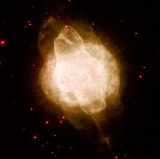
NGC 3918
Encyclopedia
NGC 3918 is a bright planetary nebula
in the constellation
Centaurus, that is called the "Blue Planetary" or "The Southerner". It is the brightest of the far southern planetary nebulae. This nebula was discovered by Sir John Herschel in March 1834, and is easily visible through small telescopes. The round or even slightly oval diameter is telescopically between 8 to 10 arcsec
, though deep images extends this to about 19 or 20 arcsec. More surprising is the beautiful rich blue colour that looks much like the coloured images of Neptune
taken by Voyager 2
in 1989.
Spectroscopy reveals NGC 3918 is approaching us at 17±3.0 kilometres per second, while the nebulosity is expanding at around 24 kilometres per second. The central star is 15.7B magnitude, and remains invisible to optical observers.
Distance is estimated 1.5 kpc.
Planetary nebula
A planetary nebula is an emission nebula consisting of an expanding glowing shell of ionized gas ejected during the asymptotic giant branch phase of certain types of stars late in their life...
in the constellation
Constellation
In modern astronomy, a constellation is an internationally defined area of the celestial sphere. These areas are grouped around asterisms, patterns formed by prominent stars within apparent proximity to one another on Earth's night sky....
Centaurus, that is called the "Blue Planetary" or "The Southerner". It is the brightest of the far southern planetary nebulae. This nebula was discovered by Sir John Herschel in March 1834, and is easily visible through small telescopes. The round or even slightly oval diameter is telescopically between 8 to 10 arcsec
Arcsec
Arcsec may refer to:* arcsecond, a unit of angular measurement* arcsecant, an inverse trigonometric function...
, though deep images extends this to about 19 or 20 arcsec. More surprising is the beautiful rich blue colour that looks much like the coloured images of Neptune
Neptune
Neptune is the eighth and farthest planet from the Sun in the Solar System. Named for the Roman god of the sea, it is the fourth-largest planet by diameter and the third largest by mass. Neptune is 17 times the mass of Earth and is slightly more massive than its near-twin Uranus, which is 15 times...
taken by Voyager 2
Voyager 2
The Voyager 2 spacecraft is a 722-kilogram space probe launched by NASA on August 20, 1977 to study the outer Solar System and eventually interstellar space...
in 1989.
Spectroscopy reveals NGC 3918 is approaching us at 17±3.0 kilometres per second, while the nebulosity is expanding at around 24 kilometres per second. The central star is 15.7B magnitude, and remains invisible to optical observers.
Distance is estimated 1.5 kpc.

